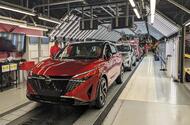This post was originally published on Autocar
Government invests £50m in new factory that will create 183 jobs
A new factory that will build powertrains for Nissan’s next-generation electric vehicles, including successors to the Leaf, Qashqai and Juke, will be built at its Sunderland site.
Operated by Japan Automatic Transmission Company (Jatco) – a firm majority-owned by Nissan and which already produces transmissions for other car makers including Renault – the new plant will directly result in 183 new jobs, with an additional 400 claimed to be created throughout the wider supply chain.
The news comes as Nissan and Jatco agreed an investment deal with the UK government, which will pump £50 million into the project as part of a push “to build a globally competitive electric vehicle supply chain”, said business secretary Jonathan Reynolds.
He added: “Not only will this boost our thriving auto industry, but it will help secure hundreds of jobs across the north-east.”
The site is Jatco’s first in Europe and so represents a massive coup for the UK, said Reynolds, adding that it was “a massive vote of confidence in the UK economy and this government’s plans to make Britain the destination of choice for investment”.
The new cash injection arrives on top of the £2 billion that Nissan and its partners had already pledged and begun spending on upgrading its Sunderland site in order to accommodate the building of its new wave of electric vehicles.
That project, called EV36Zero, includes the construction of a second battery factory next door to supply packs for the next Leaf and a third gigafactory also planned nearby, both of which will be run by Nissan’s Chinese partner Envision.
Speaking about the investment for the new powertrain plant, Alan Johnson, Nissan’s senior vice-president of manufacturing, supply chain and purchasing, said: “This is a fantastic step forward for our world-first EV36Zero plan.
“Welcoming a key supplier to the north-east of England provides a big boost to the efficiency of our supply chain. We look forward to continuing our long and successful partnership as we push towards our electric future.”
Jatco CEO Tomoyoshi Sato added: “I am very grateful for the support of the UK government, Sunderland City Council and all others involved in the establishment of Jatco UK, and look forward to supporting Nissan’s EV36Zero project with our electric powertrains.”
The transformation of the Sunderland site also includes work within the factory, such as converting production lines to accommodate electric vehicles.
The first car expected to run down them is the new Leaf, the pioneering EV morphing from hatchback to crossover. This is likely to begin as early as March, Autocar understands, given testing began in the middle of 2024. Elsewhere within the factory, the former Leaf battery assembly line is being converted for the next-generation, electric-only Juke, due in about 2027 – around the same time as the also-electric-only new Qashqai.
Nissan is also ramping up efforts to source renewable energy locally. Currently, 20% of the factory’s energy usage – which totals around 350MWh a week – comes from on-site wind and solar farms. The firm wants to boost this to 100% but has not given a timeframe for achieving that.
Training the factory’s 6000 staff for EV production is another important strand of the investment package, as is recruiting more personnel to cope with a huge rise in the number of cars built at Sunderland. Projections suggest the plant’s 300,000-unit annual output could double when the new EVs come on-stream.
However, these plans could be affected by Nissan’s announcement in November last year that it intends to cut 9000 jobs from its global workforce, and slash production by 20% to five million units per year as part of heavy cost-cutting measures. Nissan UK told Autocar that final decisions on where jobs would be cut had not yet been made.

